BEDROCK
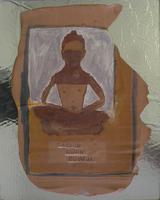 Bedrock : A Retrospective Exhibition by South African Artist George Tobias.
September 11 - 30,
Opening Times: Mon-Sat 12 - 6
Bedrock : A Retrospective Exhibition by South African Artist George Tobias.
September 11 - 30,
Opening Times: Mon-Sat 12 - 6
The Horse Hospital is proud to present Bedrock, a retrospective installation by South African artist George Tobias. Bedrock is a concluded cycle of ten years of amassed personal work - that embraces an artistic tradition which produces a personal visual archive that re-orders and catalogues the life experience. Tobias's scope encompasses aspects of the physical and spiritual universe which he seeks to allow to co-exist in the clay. The 'Buddhas' - a series of clay plaques with collaged images of Buddha figures - start with traditional religious forms but subvert them to facilitate this co-existence. The purely physical is manifest in the three-dimensional figures of 'Boys with Printed T-shirts', while 'The Tower of Babel' - an assemblage of clay plaques mounted on two metal bottle racks - is poised between the physical and spiritual. Another metal and clay sculpture, 'The Library', pays homage to the human intellect, and the stacked ceramic 'stones' of Drystone Wall to human endeavour. The pieces mounted in found frames reference the spectrum of images from the artist's archive assimilating artefacts in archaeological museums, fashionable art galleries and domestic interiors. The sculpture in Bedrock has been made using a technique developed by Tobias where the rough, clumsy monumentality of fired clay is overlayed by a delicate narrative of imagery drawn from his personal archives. Images are either transferred onto rubber stamps then impressed into wet clay or are the result of photocopier toner being applied to the wet clay before firing. Through these techniques Tobias creates unique, labour-intensive, rarefied objects whose appearance belies their sophistication. Renouncing a polished, 'professional' look for a deliberately naive aesthetic, this simple aesthetic is contradicted by its often harsh imagery, culled from the artist's history as a South African man whose family now live in the Middle East. The artist has reached this self-identity as an 'urban naive' by being prematurely introduced to modern art by his fashionable, bourgeois family during childhood. Later his studies at art school and exposure to fine art theory led him to re-appraise and identify with his earlier more accessible and iconoclastic output.
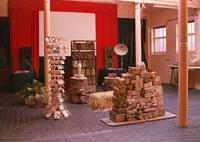 |
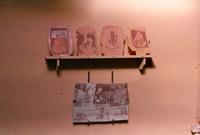 |
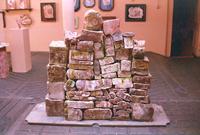 |
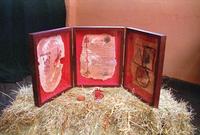 |
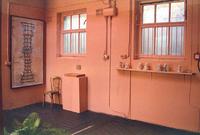
|
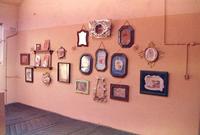 |
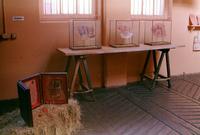 |
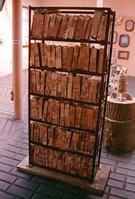 |
